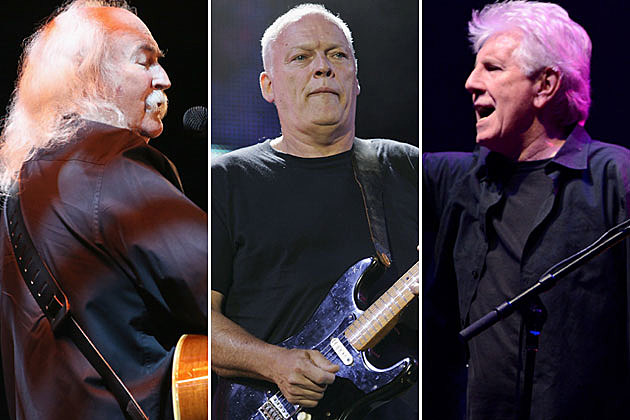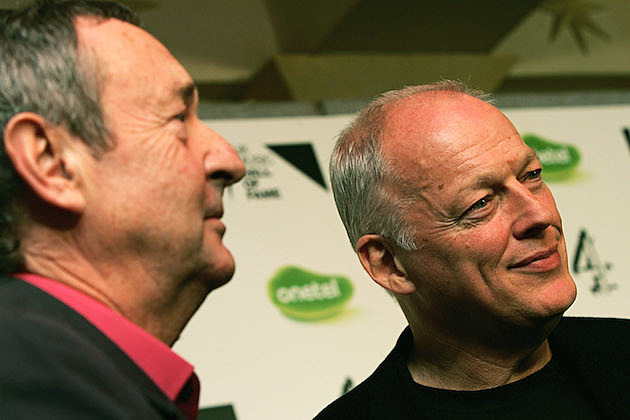Saw Brit Floyd, the Pink Floyd cover band on TV the other night. Amazing!
*************************************************************
http://blogs.phoenixnewtimes.com/up...floyd_the_ambitious_pink_floyd_cover_band.php
Inside Brit Floyd, The Ambitious Pink Floyd Cover Band
By
Glenn BurnSilver Fri., May 23 2014
 www.britfloyd.com
www.britfloyd.com
Will the real Pink Floyd please stand up? Actually, the real one has decided to sit it out for the foreseeable future, but in its place stands the live spectacle known as Brit Floyd, perhaps the closest thing to the real McCoy. With a syncopated psychedelic light show complete with video and laser projection, a full band including horn section and background vocals, and the ability to pull anything from Floyd's diverse catalog, musical director Damian Darlington says Brit Floyd is the ultimate Pink Floyd experience.
Darlington formed Brit Floyd three years ago after a 17-year stint with Australian Pink Floyd Show, which, as you can guess, is an Aussie Pink Floyd cover group. His reasoning? Simply because he felt he could do it one better.
"There is much more attention to details in every aspect of the show, from the music to the visuals to the lighting," he says. "Everything is that much more perfected and there's a passion coming off that stage. ... It's a coherent, emotional journey through Pink Floyd's catalog."
The band amazingly squeezes in something from every Pink Floyd album, from the early psych wonder of
Piper at the Gates of Dawn to masterpieces like
Animals and
The Wall to the band's final (though Roger Waters-less) recording,
The Division Bell.
Up on the Sun caught up with Darlington in New Brunswick, Canada, to talk about the process and challenges inherent in putting together the "ultimate" Floyd show, his youthful discovery of and influence by the band, and whether any original band members have checked Brit Floyd out.
Up on the Sun: This current tour is covering the band's entire career. Obviously, you can't play everything in three-hours, so how have you decided on which songs to play?
Damian Darlington: It's just a case of listening to all those 14 Pink Floyd studio albums and deciding which track from that album best represents what they were doing around that period and which one best fits in the set we're putting together. ... I suppose at the end of the day, as musical director, it's up to me to make that choice.
Are we getting just the hits, so to speak, or some more obscure songs that may actually represent better the whole of the band at that time?
Obviously, there are certain songs no matter what the theme we are going to want to put in there because people expect to hear things like "Another Brick in the Wall," "Wish You Were Here," "Comfortably Numb," "Shine on You Crazy Diamond," "Money," from
Dark Side of the Moon, etc. So, they're all going to be in there as well. There's a balance to be struck in playing the hits, as it were, and playing good representative songs of Pink Floyd from their other albums in the context of what we're doing. Hopefully, we've got that balance right.
View: https://www.youtube.com/watch?v=HYySRcY9JDQ
Is it pretty seamless? I read you're doing this in chronological order from the first album to last.
Actually, we're not. I think with the best will in the world, it would be quite difficult to make it work standing out there for two and a half hours, moving from one album to the next starting with
Piper at the Gates of Dawn and then moving to
A Saucerful of Secrets. It's not going to work like that. You have to mix things up to pace the set. You need those ups and downs to maintain a good flow.
You're press release also says you play note for note renditions of the songs. Even in concert, Pink Floyd was slightly different night after night. Is there a difference each night, any room for move outside of the box and add your own touches, if you will?
I think first of all when you're talking about the way Pink Floyd went out and toured, they created these songs and they sort of have the right
[laughs] to do what they wanted to do and change them. That's fair enough. What we're doing as a tribute band, on the level, people are coming along pretty much expecting to hear the songs in a way that's familiar to the originals. That's our starting point.
Now, within a night we can make decisions whether to do the studio version or the live version, or occasionally we'll marry two versions together and have a studio version start with a live version ending. But on the whole there is a little bit of room to put our own musical personality in there because that's what enables us to come across as a band rather than just a bunch of musicians regurgitating Pink Floyd note for note. If you put a little of your own musical personality in it, you gel as musicians a bit more and I think the audience can feel that. There's a little bit of room there for us to put our own stamp on things.
Are there any inherent challenges with playing the music of Pink Floyd other than getting it perfect night after night?
Certainly, there's the challenge of getting the feel right. Pink Floyd, they were great musicians but they weren't really technical. There weren't any really fast guitar solos or odd time signatures. But there was certainly a wonderful feel they brought to the music. That's a challenge in itself. And to recreate the sounds. Pink Floyd was so pioneering in many respects, on stage but also in the studio with all those unique sounds people really hadn't done before. To redo that successfully, when it comes to the guitar sounds and keyboard sounds and all the sound effects, it is really a challenge.
Brit Floyd includes music made after Roger Waters, a principal songwriter and vocalist left the original band in 1985. Though David Gilmour continued on without him, many detractors say Pink Floyd ended when Waters left. It's kind of like the remaining members of the Grateful Dead not playing Jerry Garcia songs after Jerry died. How do you reckon this?
Well, if you really wanted to be pedantic about it, you could argue that Pink Floyd really ended when Syd Barrett was no longer in the band. I don't personally subscribe to that. I have my personal preferences to eras of Pink Floyd I like, but
Momentary Lapse of Reason and
The Division Bell are the two albums that came after Roger Waters departed. They're still Pink Floyd albums as far as I'm concerned. I don't have any problems representing those albums.
Your press release says that "With painstaking attention to detail," you replicate "every nuance of every Floydian moment by musically and visually." Do we get flying pigs, beds, a wall, etc. as part of the visual?
There's nothing stopping us from doing that. We do have an inflatable pig. We haven't done the flying bed yet, but that's something we can maybe bring in the future. As for building a wall, logistically it's a challenge. We have performed
The Wall, but we chose to project the wall with video rather than physically build a wall. It might be fun to do in the future.
View: https://www.youtube.com/watch?v=vT-lKL3gufA
I see that you've created some original video for this tour. Can you tell me about it; where does it appear?
There's video throughout the whole show. It's an important part of the visual aspect of our show. We're not using any original Pink Floyd video imagery, but there was plenty of new creations by ([one-time Pink Floyd collaborator] Storm Thorgerson. There's CGI animation, recreations of iconic album covers -- and you get to see it with a twist from a different angle or 3-D. It's certainly an integral part of the show. It's synchronized with the music as well.
Did you listen to Pink Floyd growing up?
I definitely listened to Pink Floyd. I remember "Another Brink In The Wall" being No. 1 in the UK. It was December 1979. Probably my first memory of Pink Floyd. Then I actually heard
The Wall album in its entirety and that's what particularly drew me to Pink Floyd about the age of 12 or 13. I was fascinated by the record that told a story, and all these sound effects linking songs together, and also the wonderful guitar work. I was already learning to play guitar and I wanted to learn to play some of these wonderful guitar solos. That was my introduction to Pink Floyd. I was a fan from quite an early age.
At one point you were in Australian Pink Floyd...
For 17 years
[laughs]. It was one big point.
Why did you leave that to start this from scratch?
It seemed like it was time to move on and do my own Pink Floyd show. As I mentioned, I did Australian Pink Floyd for 17 years. I certainly learned a lot about how to do this right; acquired all the skills how to put together a Pink Floyd show successfully. It was the right time to step out. It was just over three years ago that Brit Floyd played it's first show.
How are you doing it differently?
I suppose there are a lot less kangaroos, that's for sure
[Laughs]. I just rather think we're doing it that bit better with Brit Floyd. There is much more attention to details in every aspect of the show, from the music to the visuals to the lighting. Everything is that much more perfected and there's a passion coming off that stage. We never get complacent about what we're doing and it will continually get better.
Have you received the approval, so to speak, from any members of Pink Floyd? Have Waters or David Gilmour come to check you out? Have they said anything?
Not as yet. We haven't actually had one of the [original band] members come to a show, but we know Roger and Dave have seen our DVDs. As far as I'm aware they're happy with what we do, but there's no official approval. Who knows what might happen in the future. I might be able to entice one of them down.
But we did have Guy Pratt, who played bass on the last two Pink Floyd tours, come down and get up on stage with us. That was something. And one of our backing vocalists, Roberta Freeman, sang with Pink Floyd on the 1987 tour. So there's always a little bit of a connection.
You also have your own band, something completely different, so are you going to stick with the Brit Floyd and try to squeeze the other one in when you have a break?
The future is certainly about Brit Floyd continuing. That's the main thing I do, but it's wonderful to get the opportunity to play other sorts of music when I can. I like to be a well-rounded and versatile musician, and as much as I love Pink Floyd music, I also love a lot of other music.
http://www.britfloyd.com/


